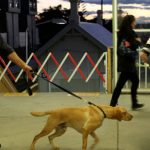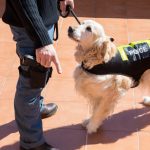Premier Wants Sniffer Dogs in Schools

The present heavy-handed approach to illicit drug use has been widely been discredited by former police commissioners, politicians and health professionals. Instead of curbing the use of the illegal drugs, it’s accepted it increases the harms associated with substance use.
However, newly appointed South Australian premier Steven Marshall has decided it’s good policy to utilise a highly ridiculed drug war tactic and send sniffer dogs into to his state’s high schools to carry out searches.
During question time on 15 May, the leader of the SA Liberal party said that he was going to follow through on a campaign promise that would see drug detection dogs deployed at schools, when principals and teachers request a random inspection.
“We don’t think that the concept of sending a police sniffer dog into a school to check whether drugs are present is a massive intrusion,” Mr Marshall told parliament. “They will be doing it in a reasonable and respectful way.”
The premier said the government will be directing SA police commissioner Grant Stevens to develop a protocol that will allow drug dogs to be sent into schools to conduct searches, which would involve searching classrooms and locker rooms, but not students themselves.
Sniffing up the wrong tree
SA Greens MLC Tammy Franks makes clear that the Marshall government’s policy is misguided. “Nobody wins a war on drugs,” she told Sydney Criminal Lawyers®. “It’s been tried, and it didn’t work because drugs are actually a health issue.”
According to Franks, drug dogs in high schools will do nothing to address problematic substance use. “They should be looking at solutions to get our kids help when they need it: getting them back on track, not setting them off on a path of exclusion,” she explained.
The “cynical” drug dog approach fails to look at the underlying causes of why students are taking illicit substances, Ms Franks pointed out. The Liberals “actually had a line in their policy which said that those students who are disengaged from school are the most likely to be taking drugs.”
“Now let’s look at why they’re disengaged,” she suggested. “Let’s look at people who are self-medicating and give them help.”
Increasing the harms
“This proposal is at best incredibly damaging and at worst alarmingly harmful,” warned Nevena Spirovska, the Victorian convener of drug law reform organisation Unharm. She outlined that sending in the dogs is basically “criminalising” high school students.
The harm reduction advocate outlined that drug dog operations in schools will “traumatise marginalised groups, and make many people, in this case, teenagers, feel like potential suspects,” as well as potentially encouraging dangerous drug taking practices.
Sniffer dog use at events, like music festivals, has been shown to lead to panic overdoses where an individual consumes all of their drugs at once on seeing a drug dog. And it has also led to people hiding their drugs in internal body cavities.
Rather than deploying drug dogs, the SA government should be sending in “alcohol and other drug education specialists to teach factual and potentially life-saving information about drugs to students,” Ms Spirovska made clear.
“This plan should be immediately abandoned in favour of a practice that would actually assist any teenager with a substance issue, rather than bringing them into contact with the justice system.”
Problematic use
SA parliament passed legislation to allow the warrantless use of sniffer dogs in public places in 2008. Ms Franks said the new policy is an expansion of this program that “is not only expensive but is also ineffective, as more than half the time sniffer dog detection doesn’t even work.”
The 2006 NSW Ombudsman report on NSW police drug dog operations revealed that only 26 percent of all searches resulted in illicit drugs being found. In most cases the drugs detected were only small amounts of cannabis and the program also failed to detect drug dealers.
And despite these early warnings, NSW police continues to be the force that’s the most heavily dependent on drug dogs in the country.
The NSW Greens Sniff Off campaign has been monitoring this flawed program since 2011. Figures obtained by NSW Greens MLC David Shoebridge revealed that in that year, 78 percent of searches were false positives: where a drug dog makes an indication, but no illegal drugs are found.
And as far as Ms Franks is concerned, the money being spent on sniffer dog operations should be put “into harm minimisation measures that actually work.” An example of such measure is the recent pill testing trial in Canberra. This is an evidence-based strategy that save lives and deters drug use.
Targeting public school students
The Marshall government proposal “is purposefully vague and targeted first and foremost at the public system, which to me suggests this is a class and law and order perception game, rather than one focused on reducing drug harms,” said Nick Wallis, the presenter of 3CR’s Enpsychedelia.
Statistical analysis of Australian Bureau of Statistics Census data obtained by Mr Shoebridge in 2016 revealed that NSW drug detection dog operations have also been targeting specific populations. This time it was in areas where there was a higher population of young Aboriginal adults.
Wallis’ radio programs is designed to counter mainstream drug narratives. And over the years of talking with experts and punters from music festivals, he’s found that people are “left feeling arbitrarily targeted, humiliated and anxious after searches.”
The SA government has said that individual students will not be searched themselves unless officers have evidence that a student has drugs on them. And while this system will be compulsory for public schools, it will be optional for private schools.
But, it’s obvious that the sight of drug dogs walking through school hallways effectively searching the whole student body will be intrusive, if not traumatising for students. And this use of dogs in schools might also be beneficial for government in getting students used to having their rights eroded.
The end of the war
Drug education is the key, Mr Wallis said. But, he questions the state of it in schools at present. “There are those out there who think that withholding knowledge, or worse yet, distorting knowledge to reflect a bias toward one particular outcome, will somehow lead to better outcomes.”
“But, drug education can’t operate in isolation of other policy changes,” Wallis went on. “Removing the penalties of use and possession would go a small way to changing how people talk about their own use and what choices in drug use they make.”
Indeed, once a system of decriminalisation was in place, young people that have problematic substance use could seek help without fear of prosecution. But further, if a legal and regulated market were in place, substances that are illegal now would be more difficult for students to obtain.







